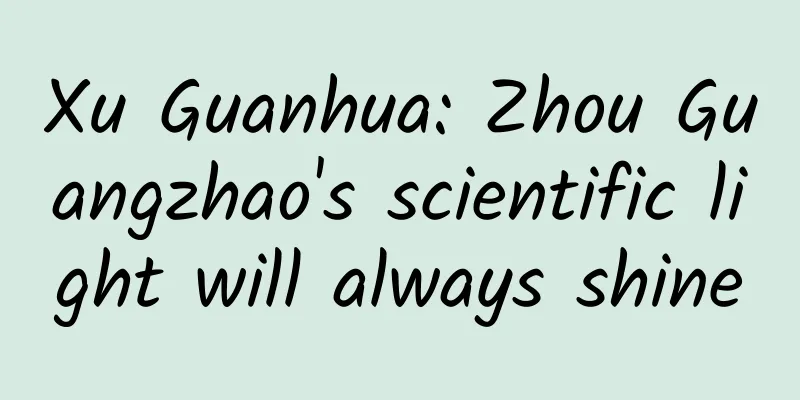Xu Guanhua: Zhou Guangzhao's scientific light will always shine

|
This article was published in the Bulletin of the Chinese Academy of Sciences, Issue 4, 2024 Xu Guanhua Ministry of Science and Technology of the People's Republic of China This article uses the important moments in the process of working with Mr. Zhou Guangzhao for more than 30 years as the context to review Mr. Zhou's unique personality charm and his deep love for the country's science and technology. From lamenting that Mr. Zhou's spirit has set a monument for the times, to highly affirming his historic contributions to the "two bombs and one satellite", national basic research, and the development of the Chinese Academy of Sciences; from rereading Mr. Zhou's "Seven Key Points of Scientific Spirit" to deriving the scientific spirit that Mr. Zhou and the author have adhered to throughout their lives. The author and Mr. Zhou have always believed that academic democracy and free debate are the only way to prosper science, academic tolerance is a materialistic scientific attitude, the growth of young talents is the future of national development, and scientific ethics is the core connotation of the scientific spirit. The author also hopes to fully experience the scientific light of Mr. Guangzhao and then seek inspiration for the further development of my country's science and technology. November 15, 2011, is a day I will never forget. At the "973 Project" expert advisory group meeting I chaired at the Beijing Conference Center, Mr. Zhou Guangzhao gave a summary speech on the "973 Project" mission. Just after the speech, Mr. Zhou suffered a sudden cerebral hemorrhage and fainted beside me. Although he was rushed to the hospital in time, after three major hemorrhages and two major operations, he never recovered and could never return to the scientific career he loved and fought for all his life. Whenever I think of this scene, I always feel mixed emotions in my heart and I can't calm down for a long time. Mr. Guangzhao dedicated his life to the motherland and science, and made a great contribution to the vigorous development of my country's scientific cause. Today, I congratulate Mr. Yu on his 95th birthday with this article. I feel it is very important and meaningful to appreciate his scientific thoughts and scientific spirit. In January 2019, after the respected Mr. Yu Min left us, of the 23 scientists who were awarded the "Two Bombs and One Satellite" Medal of Merit in 1999, only three scientists, Wang Xiji, Sun Jiadong and Zhou Guangzhao, are still alive, and only Mr. Zhou Guangzhao is still alive in the field of nuclear weapons research and development. The older generation of scientists have too many valuable thoughts and experiences that deserve our careful summary and refinement. I think the best commemoration is inheritance, and the best consolation is forging ahead. Only under the leadership of the Party Central Committee with General Secretary Xi Jinping as the core, can we better inherit and carry forward their scientific spirit and scientific thoughts, which is the best commemoration for them and can promote greater breakthroughs and better development in my country's scientific cause. Mr. Li and I have known each other for more than 30 years. He is my guide in career and my senior leader in work (Figure 1). Over the years, Mr. Li has given me a lot of help in work and academics. Mr. Li has been ill for nearly 13 years. Whenever I visit him in these years, his sincere smile and kind face always seem to emerge, which always inspires and strengthens me. Mr. Li's academic spirit of truth-seeking, upright scholarly character, rigorous academic style, and peaceful attitude towards life have always silently inspired me and benefited me a lot. Today, I would like to take this opportunity to express my understanding of Mr. Li's scientific spirit and scientific thinking, as well as my feelings for him, with 7 thoughts. Figure 1 shows Mr. Zhou Guangzhao at the author’s home. 1. Mr. Guangzhao's spirit has set a monument for the times Since 1840, China has become a semi-colonial and semi-feudal society, with internal and external troubles and people living in poverty. From the Opium War to the founding of the People's Republic of China in 1949, China suffered more than 470 foreign invasions; in the 65 years from 1840 to 1905, China was forced to sign as many as 745 unequal treaties. The determination to make China a powerful country that is no longer bullied is the dream pursued by countless people of lofty ideals and aspiring intellectuals. The people awakened by the "May Fourth Movement" held high the banner of "patriotism, progress, democracy, and science" and believed that science is the ladder of social evolution. It was in such an era that Mr. Guangzhao spent his childhood and youth. The years of hardship created his unswerving patriotism, his broad mind that cared about the world, and his personality of self-improvement. When the People's Republic of China was founded in 1949, there were only more than 30 scientific research institutions left in the old China, and the number of scientific and technological personnel in the country did not exceed 50,000. It can be said that the new China started its modern science and technology career on a blank basis. In the spring of 1957, in response to the call of the Party, Mr. Guangzhao went to the Joint Institute for Nuclear Research in Dubna, the Soviet Union, with the mission of "marching toward science" to conduct research on particle physics. Mr. Guangzhao cherished the precious opportunity given by the country and studied hard. He won the research award of the Joint Institute for Nuclear Research twice in four years, published 33 papers, and achieved remarkable achievements that the two major camps in the world at that time, the United States and the Soviet Union, praised. In June 1959, the Soviet Union unilaterally tore up the agreement and refused to assist my country in developing the atomic bomb; in July 1960, it withdrew all experts in China and took away drawings and materials. After learning about it, Mr. Guangzhao was indignant and strongly demanded to return to China to engage in atomic bomb research. In a letter of determination to the then Minister of the Second Ministry of Machine Building, he wrote: "As a scientist trained by New China, I am willing to give up the basic theoretical research I have done for many years and switch to work that is urgently needed by the country. We are always ready to obey the call of the motherland!" Inspired by such a firm belief, Mr. Guangzhao returned to his motherland in 1961. As one of the pioneers of my country's nuclear weapons science and technology, he worked at the China Academy of Engineering Physics for 19 years, dedicated the best years of his life to the country's nuclear weapons cause, and made a historic contribution to the successful development of my country's first atomic bomb and hydrogen bomb. He then made indelible contributions to a series of major tasks, including promoting the "863" plan and the "973" plan, preparing to build the Chinese Academy of Engineering, promoting the institutionalization of the Chinese Academy of Sciences, establishing the National Natural Science Foundation, building the Beijing Electron-Positron Collider, establishing the China Advanced Science and Technology Center, and promoting the "Huanghuaihai Campaign" in agricultural science and technology. Great times create great people. For decades, no matter what position he held or what work he did, Mr. Guangzhao always thought of his motherland and people first. He devoted all his energy and energy to the development of the scientific cause of his motherland, and gave back to the motherland and the people. This year is Mr. Guangzhao's 95th birthday, which coincides with the 105th anniversary of the May Fourth Movement and the 75th anniversary of the founding of New China. Mr. Guangzhao proved with his spirit and dedication that he is worthy of being a role model of the times, a scientific leader, and a people's hero. 2. "Seven Key Points of Scientific Spirit" is Mr. Li's profound philosophical thinking Mr. Zhou Guangzhao's unremitting pursuit and thinking in the cause of science for nearly 75 years has given him a deeper understanding of the connotation of the scientific spirit. In the 1990s, he proposed that the scientific spirit is a thorough materialistic spirit, which can be summarized into seven points (hereinafter referred to as the "Seven Points of the Scientific Spirit"). 1. Objectivity, realism and the pursuit of truth are the primary requirements of the scientific spirit. 2. The world is developing and changing endlessly, so the task of cognition is endless, and constant pursuit of knowledge is the requirement of the scientific spirit. 3. Do not blindly follow trends, do not blindly believe in authority, do not take contingency as inevitability, and do not take the part as the whole. Do not easily believe in the so-called "new discoveries" that have not been repeatedly verified by rigorous experiments and strict scientific reasoning. Scientific skepticism is an integral part of the scientific spirit. 4. Specific truths are relative truths and can be broken through. The spirit of innovation is an important part of the scientific spirit. 5. Newly discovered truths must contain the content of the original truths. Innovation should be carried out on the basis of inheritance. Inheriting all objective laws and correct theories proven by scientific methods is an essential part of the spirit of scientific innovation. 6. Science is a socially organized group activity. Therefore, team spirit, democratic style, and a hundred schools of thought are all components of the scientific spirit. 7. Science should not only understand the objective laws of the world, but also participate in social change and promote social progress. It is also the requirement of the scientific spirit to develop from rational understanding to the practice of change. The "Seven Key Points of Scientific Spirit" are the crystallization of Mr. Guangzhao's scientific exploration throughout his life, and are also the basic principles of his scientific practice throughout his life. Throughout his life, he regarded "seeking truth" and "being realistic", that is, "pursuing truth and seeking truth from facts" as the two most fundamental aspects of the scientific spirit. From the fact that he and his colleagues used the "maximum work" calculation to confirm the data errors of the Soviet Union's preserved materials, ending the academic debate that lasted for several months, to the abandonment of the "light" path in the exploration of the principle of the hydrogen bomb, all of these reflected his scholarly character of not being book-based, not being superior, not being foreign-based, but being realistic. During his time at the Chinese Academy of Sciences, Mr. Guangzhao, with the systematic thinking of a strategic scientist, emphasized the need to position and plan the Chinese Academy of Sciences from the perspective of the national situation. He believed that thinking about the development of the Chinese Academy of Sciences without considering the needs of the national situation and economic and social development was contrary to social development and hopeless. Mr. Guangzhao summarized this as the universal law of the existence and development of the Chinese Academy of Sciences. On this basis, he proposed the "two-power theory" of scientific and technological development: 1. Driven by scientists' free exploration, the main goal is to study the basic laws of various substances in nature and their movement, and to understand the interaction between nature and human society; 2. Guided mainly by national will and social needs, the main goal is to develop the economy and promote scientific and technological progress through market demand and feedback. Mr. Guangzhao always insisted on reforming the Chinese Academy of Sciences in order to adapt to the situation of the times and the reality of China. In the 1980s, he proposed the principles of "openness, mobility, competition, and cooperation" and "one academy, two systems", and clearly stated that "different operating mechanisms, management models, and management systems should be adopted according to different characteristics and development laws". At the 8th Academician Conference in 1996, he emphasized again: "The reform and development of the Academy of Sciences is to break the closed state formed during the planned economic system and rebuild an academy of sciences for scientists and people across the country that is oriented to the whole society and rooted in the whole society" and "the development achievements of the Chinese Academy of Sciences should prove the existence value of the Chinese Academy of Sciences". Mr. Guangzhao's truth-seeking and pragmatic strategic thinking pointed out the direction of scientific progress for the subsequent development of the Chinese Academy of Sciences. The "Seven Key Points of the Scientific Spirit" run through Mr. Guangzhao's life. After his years of scientific practice and ideological refinement, they have become a valuable spiritual wealth guiding the development of science in my country. 3. Promoting basic research is the historical responsibility of China’s scientific and technological community In the mid-to-late 1990s, as my country's economy and society developed rapidly, problems such as energy, resources, and ecological environment became increasingly prominent. Mr. Guangzhao pointed out at the 75th academic discussion meeting of the Xiangshan Science Conference: "Can China's existing resources and conditions support China's development goals? China's population accounts for about 22% of the world; arable land accounts for 7% of the world; energy accounts for 10% of the world, and coal is the main source. If we develop in this way, when the per capita GDP (gross domestic product) reaches US$7,000, China's energy will not be able to bear it." The scarcity of resources, increasingly fierce international competition, insufficient independent innovation capabilities, especially original innovation, and an industrial development model based on simply introducing technology and tracking and imitating technology have become prominent issues that restrict my country's strategic adjustment of its economic structure and the improvement of its overall national competitiveness. Facing these major problems in my country's development, there is no model to learn from and no external force to rely on. Based on his profound observation of the laws of scientific development and the forefront of world science, Mr. Guangzhao has always conducted in-depth research and thinking from the perspective of a strategic scientist. Starting from the long-term interests of the country, he has proposed a series of strategic ideas and effective strategic measures for basic research. He believes that "China must adopt new development ideas to achieve modernization and give full play to the important role of technological innovation and knowledge economy". He stressed the need to fully mobilize the initiative and creativity of scientists, strengthen original innovation capabilities, and provide support for economic and social development. In addition, Mr. Guangzhao proposed the strategic idea of "double drive", that is, basic research should rely on scientists' curiosity in exploring natural phenomena and laws, and their high sense of responsibility and historical mission to the country and the people. This unique insight provides a solid theoretical foundation for achieving the unity of national strategy and scientific exploration. As a banner of basic research in my country, the "973" program has been the focus of a lot of Mr. Guangzhao's efforts. During the 13 years he served as the head of the advisory group, he proposed a series of forward-looking ideas, and had profound and systematic thinking on the strategic positioning, scientific evaluation, integration of upstream and downstream of the innovation chain, talent training, resource allocation, and academic style construction of the "973" program, forming a set of basic research development thought system with Chinese characteristics. It can be said that the "973" program was one of the key tasks that Mr. Guangzhao focused on in his later years. Without him, there would be no brilliant achievements of the "973" program. His last efforts were also spent on the "973" program. At the expert group meeting on November 15, 2011, in his speech, he recalled the past, systematically summarized the successful experience of the "973" program, and made prospects for the future of the "973" program. When talking about the setbacks and hardships encountered by the Chinese Academy of Sciences in those years, I sat beside him and felt the twinkle in his eyes and the excitement in his voice. I realized how difficult it was for him. Sometimes I feel very guilty, thinking that if I hadn't asked him to give a report that day, maybe he wouldn't have collapsed from exhaustion. So, when I took over as the head of the advisory group from him, I felt that I was not only taking on an important job, but also a heavy responsibility that carried his earnest expectations. I dared not slack off even a little. Mr. Guangzhao has always regarded the development of basic research as the historical responsibility of China's scientific and technological community. He believes that in the context of international competition, only by fully recognizing the status of basic research and the historical mission of scientific and technological workers in developing basic research, and mastering and participating in the discovery of the latest scientific and technological knowledge, can China achieve sustainable development and gain a foothold among the world's nations. 4. Academic democracy and free debate are the only way for science to flourish The pursuit of academic democracy and free debate is Mr. Guangzhao's consistent spiritual pursuit. In the 1970s, when there was no reference material for the exploration of the principle of hydrogen bomb, Zhou Guangzhao, Deng Jiaxian, Yu Min and other gentlemen held a "free discussion" meeting to encourage young people to speak the truth, and specially carried out the "three old and four strict" style of study education, strongly emphasizing that everyone is equal before the truth, advocating collective research, promoting democracy, brainstorming, and making suggestions. It was in such a free and democratic academic atmosphere that the principle of hydrogen bomb made a breakthrough. From the first atomic bomb to the first hydrogen bomb, it took the United States 7 years and 4 months, the Soviet Union 4 years, France 8 years and 6 months, and my country only 2 years and 8 months. In 2005, Mr. Guangzhao recalled this glorious period and said in particular: "Academic democracy and free discussion are the most precious spiritual wealth; without the spiritual pursuit of scientific democracy, our atomic bomb and hydrogen bomb would not have made such a rapid breakthrough" and "the debate of different opinions is an important driving force for the development of science." The debate of different viewpoints not only reflects scientific viewpoints and academic thoughts, but also embodies academic thoughts and scientific spirit. It constitutes an extremely important part of science and plays a very important role in the development of science. He once pointed out: "It should be normal to carry out academic criticism, but it does not work in China, especially criticizing authority, which has almost become a vacuum." "Once the authority or leader speaks, no one is allowed to speak, and no one dares to speak. Mr. Guangzhao always set an example by upholding academic freedom and allowing a hundred schools of thought to contend. At the same time, he always insisted on non-interference of administration in academia, and stressed that administration should provide good services, provide better conditions for the better development of academia, and remove obstacles to academic research. Telling the truth is the most profound impression Mr. Li left on me. He mentioned to me many times that if science loses academic freedom and democracy and is based on seniority, the future development of Chinese science will be worrying. 5. Academic tolerance is a materialistic scientific attitude “An accomplished scientist should not only pay attention to theory, but also to experiment. It is of course a cause for celebration when the theoretical and experimental results are consistent. However, an accomplished scientist should especially grasp the inconsistencies between theory and experiment, because from such inconsistencies, one can discover the deficiencies of theory or experiment, which may lead to new breakthroughs.” This is a famous saying by Mr. Guangzhao. In response to the blind pursuit of the number of collected papers in my country's scientific and technological circles, he sharply criticized: "We must avoid the evaluation system's eagerness for quick success and instant benefits, advocate the spirit of sharpening a sword for ten years, and guide scientists to engage in work with longer-term impact and great scientific significance." He proposed that original innovation ability should be used as an important evaluation indicator so that the most creative ideas can be strongly supported. We should promote interdisciplinary research, as interdisciplinary disciplines are most likely to produce breakthrough discoveries and innovations. There will be setbacks and failures on the journey to major discoveries. Scientists entering new fields must be confident, not afraid of failure or ridicule, and make unswerving efforts to achieve their goals. Success should be encouraged, and failure should be encouraged even more. There are no losers on the road of scientific exploration, only pioneers, and everyone who explores forward is a hero. For a long time, there has been a "take-it-and-use-it" mentality in China, and there is a keenness to follow and imitate in scientific research. In this regard, Mr. Guangzhao pointed out: "Lack of self-confidence and a mentality of eagerness for success are one of the major obstacles to creativity. Good learning and high self-confidence are the important qualities of talents." High-tech cannot be learned or bought, and there are too many painful lessons of this kind in my country. We must treat scientific research with an inclusive heart. Allow mistakes and encourage trial and error. At the same time, we must listen to different academic views with an open mind and accept criticism from others with an open mind. Only in this way can our scientific cause usher in a more vigorous development. 6. Scientific ethics is the core connotation of scientific spirit During his tenure as president of the Chinese Academy of Sciences, Mr. Guangzhao proposed that academicians should be active promoters of scientific ethics and role models for scientific and technological workers across the country. At the 1994 Academic Department Joint Office Work Conference, he emphasized that academicians should be role models in the scientific and technological community for adhering to a rigorous, serious, and strict scientific attitude and a pragmatic style of work. At the 1996 Academician Conference, Mr. Guangzhao seriously proposed again: "The trend of fraud and hypocrisy in society has spread to the scientific and technological community. In recent years, in the work of project establishment, achievement evaluation, and professional title evaluation, there have been occasional cases of laxity, lack of seriousness, even disregard for scientific norms, lack of scientific ethics, exaggeration, and fraud..." Mr. Guangzhao's serious criticism at the time is still deafening and thought-provoking today. The Chinese Academy of Sciences and its academicians are the highest academic institutions and the highest academic titles in the scientific and technological community, with lofty authority and honor. We must inherit the fine traditions of our predecessors, uphold truth, seek truth from facts, be rigorous in our studies, be meticulous, be strict with ourselves, make selfless contributions, set an example for society with our truly profound knowledge and noble character, and promote its healthy development. Human civilization has been recorded for 6,000 years. Human development has benefited from the continuous understanding of nature and the resources it needs to survive. How can we promote sustainable development for another 6,000 years? What can we contribute to the future? This is a profound topic that requires us to answer together. But I think that studying and learning Mr. Guangzhao's spirit and character can give us very useful enlightenment. Salute to Mr. Guangzhao! May the scientific spirit live forever! Acknowledgements Thanks to Huang Xieqin for his help in the compilation of this article. Xu Guanhua is an academician of the Chinese Academy of Sciences. He is the former Party Secretary and Minister of the Ministry of Science and Technology. He is mainly engaged in the research of resource remote sensing and geographic information systems. The article comes from: Xu Guanhua. Zhou Guangzhao's scientific brilliance will always shine. Bulletin of the Chinese Academy of Sciences, 2024, 39(4): 785-792. Doi: 10.16418/j.issn.1000-3045.20240227003. Executive Producer: Yang Liuchun Editor in charge: Zhang Fan Assistant Editor, Proofreader: PAN Layout: Cao Yixuan |
Recommend
How to choose vinegar? Is vinegar really nutritious?
I have talked with friends before about how to ch...
Guangxi border residents can have four children! What are the specific regulations? Will there be a fine for having a fourth child now?
At present, my country has relaxed the three-chil...
Live streaming sales: Solve these 3 fatal problems first
Today, I suddenly felt like talking to you about ...
Hot sales of iPhone 6 cause Android's global market share to decline
Research firm Kantar Worldpanel ComTech (hereinaf...
How much does it cost to invest in tattoo and embroidery mini programs in Changchun?
How much does it cost to recruit investors for th...
How to deal with the H1N1 flu outbreak? Is it too late to get vaccinated now?
Although everyone has made some preparations to d...
Is it reliable to determine parent-child relationship based on blood type? Why is it so difficult to determine parent-child relationship based on blood type?
Audit expert: Jin Tao Chief Physician of Hematolo...
3 tips to teach you how to easily build a user operation system!
1. Opening What is important in operations is a w...
What? Pineapple soaked in salt water has no effect? It turns out that I have been doing it wrong all these years
Reviewers of this article: Zhang Zheng, PhD in Nu...
WhatsApp will allow transfer of chat history between iOS and Android devices
Mobile messaging app WhatsApp is adding the abili...
Summary of my experience at Baidu and Meituan: How to build an operations team from scratch!
From entrepreneurship to Baidu, and then to Meitu...
Find a partner! I bet you never thought of this benefit.
One of the topics that elders talk about when the...
“Famous scenes” in Egyptian murals: applying spices, wrapping bandages… Where did mummies come from?
...
LeTV Cast vs DingTalk Cast, which one should you choose for startup company conference casting?
Management guru Drucker once said: If there is no...
Marketing hotspots and advertising suggestions in August!
Chinese Valentine's Day, the start of the sch...









